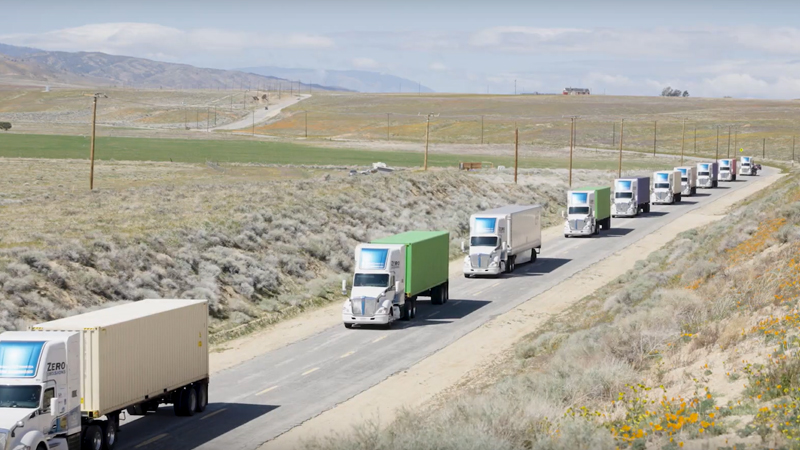November 14, 2022

Ten Fuel Cell Electric (hydrogen) trucks took part in a year-long pilot test at the LA port. Toyota
The Ports of Long Beach and Los Angeles are key testing grounds for hydrogen trucking in the U.S. The combined ports handle 40 percent of imported waterborne trade. In 2017 the ports set a goal of transitioning to zero-emissions cargo-handling equipment by 2030 and a zero-emissions drayage truck fleet by 2035. In August, the state of California adopted the same horizon for achieving zero emissions for all types of vehicle sales statewide.
A year-long test of 10 hydrogen trucks at the Port of Los Angeles concluded in September. It used hydrogen trucks jointly made by Kenworth and Toyota. One participating company, Southern Counties Express, put 3,600 miles on its hydrogen truck traveling from a rail yard to a warehouse, then from the warehouse to port terminals.
“We clearly showed that hydrogen is a viable clean fuel capable of powering commercial transportation for customers, matching diesel performance in range and power,” said Joe Adams, Kenworth’s chief engineer. Some of the trucks remain in operation for further testing.
Looking to the future, Chris Cannon, chief sustainability officer at the Port of Los Angeles, predicts that the Port will likely include a mix of electric and hydrogen trucks with the latter “used where you need more range and the duty cycle is heavy.” He gave the example of transporting containers 50 miles or more to the massive complex of warehouses at the Inland Empire. Under heavy traffic, electric trucks may be limited to one round trip per day; with greater range, hydrogen trucks could do two. “If you have a 400-mile range truck, you have a lot more flexibility in what kind of business you run,” he said.
The shift to zero-emission vehicles has been popular with drivers. Cannon said they like that “you don’t smell like diesel fuel at the end of the day,” and appreciate the “extra zip” of the high torque powertrains. Just as important he said, like everyone, “they are more conscious of the need to do things that are respectful of the environment and happy to be driving something that is environmentally sound.”
He foresees that hydrogen long-haul trucks will be commercially viable in the next “two to three years.” As for shorter-haul urban delivery vehicles, he said, “There is no reason that every single one of those shouldn’t be electric.”